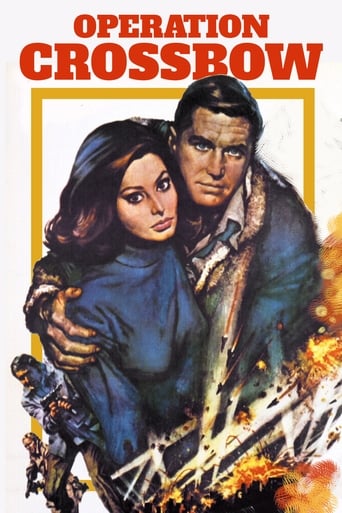Leofwine_draca
OPERATION CROSSBOW is a fine British WW2 thriller that's much more a resistance thriller than the gung-ho story that I was expecting. The supporting cast is exemplary and acts as a kind of "who's who" of British cinema with the likes of Trevor Howard, Richard Johnson, Richard Wattis, Sylvia Sims, and many, many others playing various peripheral or important characters. Even Patrick Wymark is on hand with a pretty accurate depiction of Churchill.The story is about the development of Nazi rocket technology and the attempts by Allied forces to halt or delay its advance. The main three characters are played by the nervous Tom Courtenay, the heroic George Peppard, and the excellent Jeremy Kemp, all of whom are parachuted into occupied Holland and forced to undertake false identities in a bid to infiltrate the institution in which the rockets are being built. The suspense is never-ending and although there isn't much in the way of on screen action this is just as gripping as if there had been. Sophia Loren is stunning in a fine role as a woman mixed up in the sabotage plot while Anthony Quayle is well cast against type.
SimonJack
"Operation Crossbow" is a fictional movie based on historical events of World War II. It's a historical look at Hitler's program to develop rocket weapons and the Allied efforts to foil the Germans. The plot has enough intrigue and action to make the film entertaining. And, the bombing scenes keep the sense of urgency about the race between the Allies and the Germans the last two years that would determine the war's outcome. The film has a cast of notable movie stars of the day; but I think only a couple stand out for their performances. Trevor Howard is excellent as Professor Lindemann, and Tom Courtenay is very good and convincing as Robert Henshaw. The real pluses for this film are four. First, it's a reasonable portrayal of historical events and some key people of the time. Second, it has excellent camera work. Third, it has very good recreations of the German rockets and testing sites and of the bombing scenes in London and the air raids on the German sites. Fourth, it uses some actual war film footage sparingly.During World War II, Operation Crossbow was the code name for the overall Allied effort to destroy the German rocket and long-range bombing projects. It began in early 1943, under the code name "Bodyline," when Allied planes photographed a V-2 rocket site in northern France. The code name changed that fall. Some of the film characters are based on real people and use their names. Others are amalgams of people. The roles of the main stars aren't real people. Besides Winston Churchill, other British leaders portrayed were real. Richard Johnson plays Duncan Sandys who was in charge of Operation Crossbow. He had been wounded while fighting with British forces in Norway after Germany invaded that country in early 1940. He also was Churchill's son-in-law at the time. In this movie, Sandys often is at odds with the chief science adviser to his group, Professor Lindemann. Frederick Lindemann was a real person and the chief science adviser to the British war effort. He was a close friend of Winston Churchill and made significant contributions to the Allied war efforts. But, he believed that the German rocket program was a hoax. Another leading scientific adviser was Reginald V. Jones with whom Sandys often clashed. It seems that the film writers combined the two British scientists under the character of Lindemann. Constance Babington Smith, played by Sylvia Syms, was another very real person in the film. She was the British photo interpreter who first spotted a German rocket site from aerial photos. Another real character was Hanna Reitsch, played by Barbara Rutting. Reitsch was a renowned German aviatrix who set many flying records. She was a test pilot for the Nazis and was the only woman to receive the Iron Cross first class. She survived the war and set many glider records. Reitsch died at age 67 in August, 1979, at Frankfurt – then, West Germany. MGM's British film group did an excellent job recreating the German Peenemünde rocket research and testing site. The filming was done along the Norfolk coast, NNE of London. Its North Sea location and coastline probably very closely resembled the real German site along the Baltic Sea. Watching this film again, I understood how the British early on were concerned about Germany's advances in weapons. After the war, and through the 1950s, there was a general sense in the U.S. – and perhaps much of the world – that the Germans were generally superior in the fields of science and engineering. I grew up with that notion. My dad had served in the Army in Europe during WW II, and I later served in the Army in Germany during the Cold War. The Germans continued to excel in cameras, tape recorders, other electronic production and automobiles. But, with the passage of time and greater public awareness of recent history, we now know more about the seeming German prowess in the sciences. In fact, most of technology and development of the German rocket program had been pioneered almost two decades before by an American scientist, Robert H. Goddard (1882-1945). Today, Goddard is recognized as the father of modern rocketry and the father of the space age. How ironic that when he died in 1945, many still doubted and dismissed him and his work. Yet, he had launched the world's first liquid-fueled rocket in March 1926; and he and his team had launched 34 rockets from then until 1941. He was working with grant monies and obtained more than 200 patents. But much of his work took place during the depression. And, no one – the U.S. government included, seemed interested in all the possibilities that Goddard had envisioned from rocket science and achievements. My DVD of "Operation Crossbow" had a 10-minute short special with it, "A Look Back at Crossbow." It has some early film clips of Goddard's first attempts to launch rockets. One can see these today on YouTube. This short documentary noted that Germany collected all of the Goddard research achievements for a mere 10 cents per copy from the U.S. Patent Office. And, Adolf Hitler had his Nazi regime embark on a huge R&D program for weapons superiority shortly after he came to power in 1932. The rest is history. Another American also had much to do with Japan's recovery after the war. W. Edwards Deming was a scientist whose work Japanese industry took seriously. In just two decades, Japan grew to become a world power based on its high quality and innovative production. Japan's industry created the Deming Prize in 1951. President Reagan awarded Deming the National Medal of Technology in 1987. But, just as with Robert Goddard, Deming's work wasn't widely recognized in the U.S. until after his death in 1993. And, that's another whole story.
glenn-aylett
This is a story about an attempt to destroy a factory making V2 flying bombs. Partly based on fact as these weapons and factories existed, but the plot where a group of agents are sent to Germany to destroy the underground factory is fiction.Basically this is a so so film. It's also confusing as the cast switch between English and German with no warning, Sophia Loren's appearance as George Peppard's love interest in a German hotel and her sudden execution seem pointless, and parts of the film are slow moving.However, this is compensated for by some excellent sets and action at the end. The flying bombs look very convincing and the scenes where they land on London look very realistic, particularly where a street is blown apart. Also the underground factory where the rockets are being assembled could pass for a set out of Bond( obviously the money is well spent on this) and the gun battle between Peppard and a group of scientists and SS men is pretty exciting, as is the final scene where a dying Peppard opens the roof of the factory so the RAF can destroy it.Yet is there anything that memorable about the characters. George Peppard isn't that memorable as the leading man, Sophia Loren seemed to be there as eye candy( mind you, I never thought much of her acting skills), Richard Todd is wasted in a minor role, and Anton Diffring is on hand to play, you've guessed it, an SS officer. Only Anthony Quayle as a half British Gestapo man seems to be the only character that stands out.I would say persevere with Operation Crossbow as the last half hour is excellent, but it is slow in places and the characterisations aren't very good.
TheLittleSongbird
Operation Crossbow was a film I enjoyed a lot. I didn't think it was perfect, some scenes drag and you can tell that Trevor Howard is not entirely interested in his role. That aside, it is very well directed, is well made with great cinematography and editing and has a brooding Ron Goodwin score. The film is talky, that I agree, but the dialogue is very good and the story compelling with on the whole with tense suspense and atmosphere, intriguing subplots and a thrilling action-packed finale. The acting is fine, George Peppard is likable, and while Sophia Loren's appearance is brief it is one along with her shocking death that is memorable. Tom Courtenay and John Mills are also well cast. Overall, an impressive film. 8/10 Bethany Cox





